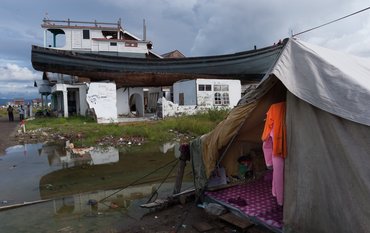Organised by the GFZ Section 4.4 “Hydrology” and under the umbrella of the Collaborative Research Centre “TerraQ” (SFB 1464), the world's first workshop on the “Absolute Quantum Gravimeter” (AQG, Exail) took place from 22 to 26 January 2024 at Leibniz University Hannover (Germany). It was the first meeting of the community after this instrument became available as the first commercially available new type of absolute gravimeter. The AQG is a gravimeter which uses quantum technology of free falling, cooled atom clouds for measuring the acceleration due to the attraction of the Earth and related masses.
Extended areas of application thanks to the new device
In the geosciences, for example, it can be used to quantify spatial changes in the water reservoir as part of measurement campaigns, but also to observe the dynamics and development of magma chambers in volcanic structures. In contrast to traditional devices of this type, the AQG can be used outdoors. This mobility and flexibility make it possible to expand the areas of application as well as the issues to be addressed, not only for geodesy, in which gravimetry traditionally plays an important role, but also for applied research.
International workshop with lively exchange
The two-day event was attended by more than 30 participants from 14 organisations and 7 different countries, including the instrument manufacturer (Exail). First experiences with the instrument were exchanged and theoretical questions related to the measurement principles, instrument development, open questions and future standards were discussed. The main aim of the workshop was to initiate a continuous exchange within the AQG community and to establish a user platform.
Besides the traditional field for gravimetry, geodesy, the AQG community and its end-users were spread within applied geoscience in e.g. hydrology and vulcanology. Engaging and extensive discussions in an open and welcoming atmosphere contributed to the success of the workshop.
First comparative measurements at the same location
Along the workshop, measurements with AQGs were carried out for a week in a gravimetric laboratory at Leibniz Universität Hannover. A gravimetric laboratory is characterised by very stable foundation structures on which the devices are placed and also offers constant conditions in terms of room temperature and humidity. The aim is to minimise possible interference factors on the measurements.
Five AQG units of the same type (version B) came together in one room for the first time anywhere in the world. The joint measurements were carried out with the intention of testing certain device characteristics and behaviours, with the focus on comparing the devices. Among other things, this involved the noise behaviour of the devices and their stability during longer measurements. Repeatability, i.e. how accurately a result can be measured again at the same point, was also a central point of the comparison.














![[Translate to English:] [Translate to English:] Abror Gafurov von dem Schriftzug "Welcome to Azerbaijan" und den UN und COP Logos](/fileadmin/_processed_/2/5/csm_2024_11_Baku_COP29_Abror_Gafurov_1042faec82.jpeg)


![[Translate to English:] Martin Herold standing in front of the library on the Telegrafenberg](/fileadmin/_processed_/c/d/csm_Martin_Herold_d385ee4dd9.jpeg)
![[Translate to English:] Many people are listening to a presentation in the GFZ lecture hall.](/fileadmin/_processed_/c/a/csm_1_Bild1_hell_b9c0e9f5ed.jpeg)






![[Translate to English:] Both scientists sitting on stools in front of a wall of books in the Telegrafenberg library](/fileadmin/_processed_/6/6/csm_Buiter_Castell_DORA_4_e87cb1ea18.jpeg)
![[Translate to English:] Gruppenbild mit 4 Personen](/fileadmin/_processed_/8/d/csm_20241017_GFZ-Emmerman-Medal-005_web_reinhardtundsommer_21a414fa4a.jpeg)






![[Translate to English:] Ice landscape with five red tents](/fileadmin/_processed_/8/9/csm_Zeltlager_auf_dem_Eis_Urheberin_Jenine_McCutcheon_5ced2d523b.jpeg)

